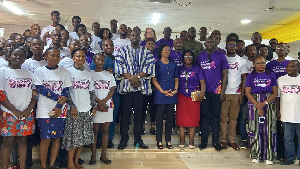The Gaming Commission of Ghana, in partnership with the Mental Health Authority, has launched a renewed campaign to tackle gambling addiction among tertiary students, warning that irresponsible gaming is quietly destroying lives, careers, and communities across the country.
Held at Accra Technical University (ATU) as part of the 2025 Mental Health Awareness Month, the sensitization programme brought together key stakeholders, including Members of Parliament, university authorities, health professionals, and students.
Themed “Promoting Responsible Gaming: Exploring the Linkage Between Mental Wellness and Gaming Addiction,” the event highlighted the urgent need for collaborative action to curb gambling-related harm.
Speaking at the event on May 28, 2025, the Acting Commissioner of the Gaming Commission emphasized the rising rate of gambling addiction among the youth in Ghana.
“Studies show that nearly 70% of young people in Ghana engage in entertainment gambling. Some do it for fun or to win money, while others use it to cope with unmet psychological needs, but when it crosses a threshold, it becomes dangerous.”
He warned that gambling addiction can lead to depression, anxiety, drug use, financial ruin, and even jail time for those who steal to fund their habits.
“We don’t want to lose a single student to gambling; this must be a collective fight. Be your brother’s or sister’s keeper. Report gambling addiction.”
He also announced plans to establish a Gaming Addiction Rehabilitation Centre in Asawase, Ashanti Region, with support from the Interior Minister, Mohammed Muntaka-Mubarak.
Dr. Zanetor Agyeman-Rawlings, MP for Korle Klottey, painted a grim picture of the far-reaching effects of addiction.
“The reality of addiction is that it can destroy your life and the lives of those around you. It can derail your entire career.
“There are highly influential individuals in sensitive positions who are addicted to various forms of gambling and, as a result, misappropriate public funds. They steal money entrusted to them in order to feed their addiction.
“They get fired from one job, find another, and repeat the same cycle. Addiction does not discriminate; you must understand that. It doesn’t matter who you are, where you come from, how old you are, what your background is, or how much money you have in your pocket.”
John Dumelo, Deputy Minister for Food and Agriculture and MP for Ayawaso West Wuogon, shared his past struggles with sports betting.
“I used to bet some years ago, and I became addicted to my phone. During the day, I always wanted to check which games were playing so that I could put some GHC 200 on them and see how best we could multiply it.
“At some point, I realized that the habit was consuming my time, and what pained me the most was Aviator. I have friends who are also addicted to betting, but I believe betting addiction is something we all need to pay attention to.
“I think it is a quick way to make money, but it is also a quick way to ruin or even end your life. So, I urge everyone to be very responsible when it comes to betting because we need you, the youth.”
The Pro-Vice Chancellor of ATU, Prof. Amevi Acakpovi, whose speech was read on his behalf, warned that the societal cost of unchecked gambling addiction is too high to ignore: “When the consequences of gaming exceed normalcy, society suffers. We must all get involved in this national effort.”
AM/KA



